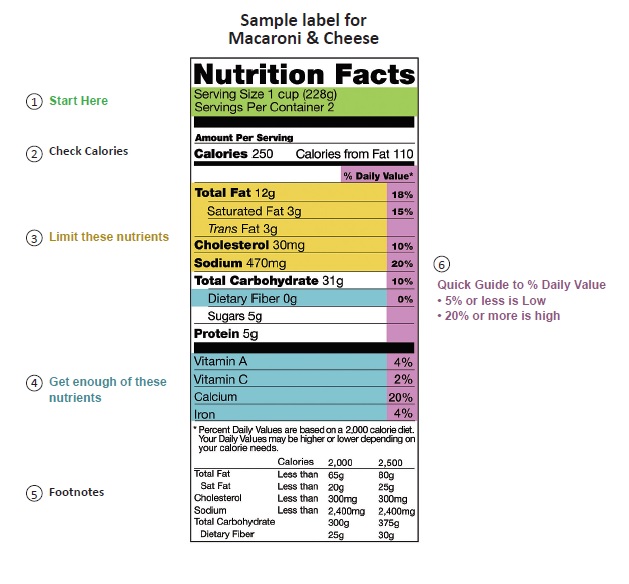Celebrating National Nutrition Month this March
A nutritious diet is an important part of a healthy lifestyle.
The food you eat provides the fuel your body needs to grow and function properly. Since your stomach can only hold a certain amount of food each day, it is important to fill it with a variety of healthy foods. No food is bad for you. The goal is to eat healthier foods more often and those excessive salt, sugar or unhealthy forms of fat less often.
Making sense of food labels
The easiest way to discover a food’s nutritional value is to read its label. All packaged foods must have labels that tell us what is in the food and how nutritious it is. There is a lot of information provided on a food label, so knowing how to decipher what you are reading can be challenging. It’s always a good idea to check with your doctor about recommendations that make sense for you, but these basic guidelines are a good place to start a conversation.

Fat
- Per serving: less than 3 grams and no more than 5% Daily Value
- Daily amount: 44-77 grams
- For someone with diabetes: 10-15 grams
Salt
- Per serving: 140 mg or less
- Daily amount: 1,500-2,300 mg or less
Fiber
- Per serving: 3-5+ grams
- Daily amount: 25+ grams
Sugar
- Daily: 24-36 grams, or 6 tsp for women and 9 tsp for men
Protein
- Daily amount: 50 grams
- For someone with diabetes: 15-35 grams per meal
Carbohydrates
- For someone with diabetes: 45-60 grams per meal
More tips to keep your nutrition on track

- Fruits and vegetables are mostly low in calories and contain healthy fats, so you can eat as many servings as you like. Remember that adding salt, unhealthy fats or sugar to fruits and vegetables limits the potential health benefits your body can take from these foods, so keep it simple!
- Fiber is essential for a healthy diet. Fiber is found only in plant foods, including fruits, vegetables and whole grains. The more a food looks like it did when it was grown on a tree or in the ground, the more fiber it contains.
- Sodium is an ingredient in salt, which your body needs to manage blood pressure, but too much sodium can cause health problems. Avoiding processed foods and flavoring foods with herbs, lemon juice or different types of vinegar is a good way to keep sodium intake under control.
- Sugar is fun, but the average American consumes too much per day. When sugar is consumed in high amounts, it can cause cavities, weight gain, diabetes and heart disease. Drinking water instead of soda, energy and sports drinks, sweetening foods with fresh fruit and opting for fresh foods instead of processed treats are all easy ways to cut back on sugar.
- Fat is an important part of a healthy diet, but too much of the unhealthy kind can lead to weight gain and higher risk for chronic diseases. Choosing lean meats, tomato-based sauces instead of cheese or cream-based sauces and opting for olive, canola or corn oil over shortening, butter and margarine are just a few way to reduce fat in your diet.
Fine out more about the Self Management, Health and Exercise programs offered by Oasis.






I believe Oasis is and will be a great oprtunity for me to further my learning and educatiion that they can offer .
True. Stay informed.